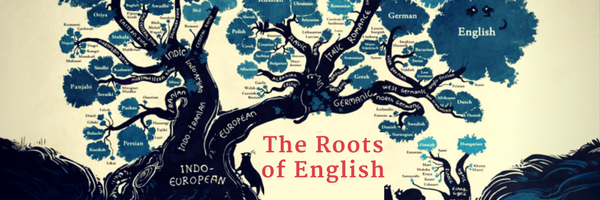Where Does English Come From?

Recently I posted a blog about English pronunciation which outlines how many different vowel sounds there are in English – nineteen. NINETEEN! 19!! No wonder you find it difficult. So here is an article that explains why.
I am studying English teaching, and the first unit is about the history of the English language. I was asked to write a brief summary of where English comes from and what has changed over time.
Well, it was not so straightforward (simple)! The language that occupied the British Isles has changed so much in the last 1500 years. In fact, when I listen to Old English, I do not recognise any words at all! Wars, invasions and migration have shaped the language in many complex ways. That is why modern day English includes such a mixture of different vocabulary, and pronunciation is so varied.
Indo-European origins
English, Spanish and most of the world’s languages all come from the largest language family called Indo-European. Several subdivisions broke off as the late stone age civilisations migrated across Europe and Asia. Two of the most well-known subdivisions were Latin and Germanic.
Old English (450 A.D.)
The original inhabitants of the British Isles were the Celts (Irish, Scottish, Welsh). However the British Isles were occupied by the Romans, bringing many Latin influences to the language. The Germanics (Saxons) migrated from Scandinavia all throughout Europe, pushing the Celts back to Ireland and surrounds. This is why many languages spoken today, including English, generally use Germanic grammar and form.
The Vikings, another Germanic tribe, invaded and kept power for a short time, bringing some Norse words to the language: (Thursday = “Thor’s Day”)
Listen to an excerpt of The Lord’s Prayer in Old English.
Middle English (1100 A.D.)
The French invaded England and introduced many French words. However only the royals and nobility spoke French. The commoners (95% of the population) spoke English, which was considered a low-class, vulgar language.
This is why many words for foods served to the nobility such are from French roots, whilst the words used for the animals that the English peasants slaughtered are English.
French words: beef, mutton, pork and venison
English words: cow, sheep, pig and deer
Listen to an excerpt of The Lord’s Prayer in Middle English.
Early Modern English (1500 A.D.)
After the printing press was invented, English started to spread through books and became more standardised. However this is the time when William Shakespeare influenced English heavily with his literature. He borrowed words from Latin, French and Greek, plus he completely invented words of his own.
We owe over 1700 modern English words (and many great insults!) to Shakespeare such as bubble, eyeball, cold-blooded, gossip and undress.
Late Modern English (1700 A.D.)
The industrial revolution changed English even more when the invention of new machines and technologies, plus the discovery of science, necessitated the invention of new words. The English therefore borrowed many words from Latin and Greek to fill this need.
Industrial revolution words: Astronomy, stethoscope, oxygen, centigrade, combustion, locomotive, factory.
At the same time, the British Empire was sailing the seven seas to colonise all regions of the world such as Australia, India and America, therefore bringing back many words from many countries.
British Colonisation words: Boomerang, kangaroo (Australia), pyjamas, jungle (India), brave, raccoon, tomato (American Indian).
Listen to an excerpt of The Lord’s Prayer in Modern English.
Contemporary English (1900 A.D)
English form hasn’t changed much, but new vocabulary was needed after the introduction of digital technologies such as computers and popular entertainment culture.
The internet has influenced the invention of universal slang, abbreviations and acronyms. It has also allowed for English to spread much further and more easily across the world, leading to even more differences in pronunciation.
English has a lot of inconsistencies because of its history, which is why learning English can be complicated sometimes. I now have even more respect for people who are taking the big step to learn English. So don’t feel discouraged if you have trouble. By understanding the complex origins of this language, you should be proud of yourself for coming this far! “I tip my hat to you!” (An idiom for ‘I respect you!’)

The Cookie Chef
Follow my blog!
If you found this article interesting, please subscribe below for more articles like this straight to your email.
Or, follow me on my social media at the top of the page to stay up to date with my posts!
